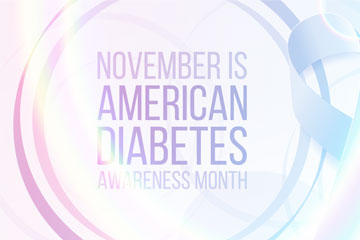
Diabetes is the most widespread “lifestyle disease”. According to a 2020 report from the Centers for Disease Control and Prevention (CDC), an estimated 34.2 million people, or 10.5% of the U.S. population have diabetes and about 7.3 million people have diabetes but have not yet been diagnosed (2018). The American Diabetes Association (ADA) observes November as American Diabetes Month to sound the alert about the diabetes epidemic and alert people about their risk. The theme for 2022 is “Today’s Diabetes Hits Different”! The disease has different risk factors and complications from before the COVID-19 pandemic.
Diabetes mellitus is a medical condition in which blood sugar level becomes abnormally elevated. Blood glucose is the main source of energy that you get from food you eat. Insulin, the hormone created by the pancreas, helps glucose from your food get into your cells to be used for energy. When the body doesn’t make any or adequate insulin or doesn’t use it properly, the glucose stays in your blood and doesn’t get to your cells. Overtime, this will cause diabetes and related health problems.
Though diabetic is a chronic condition, it can be managed. There are three types of diabetes: type 1, type 2 and gestational diabetes.
Type 1 diabetes: This autoimmune disorder can develop even before the person enters adulthood and is caused when the immune system destroys the cells that produce insulin.
Type 2 diabetes: This type usually develops when the body is not able to use insulin properly to regulate blood sugar.
Gestational diabetes: This condition occurs during pregnancy. Like type 2, it is cause by the improper functioning of insulin.
Of three types, about 95% of the cases are type 2.
Tips to Manage Diabetes
Knowing how to manage diabetes can help your immune system to work efficiently and reduce your chances of serious medical conditions like a heart attack, nerve damage, kidney failure, blindness, and more.
- Eat healthy: Eating nutritious food is essential to support muscle health and immunity. Follow a balanced diet with plenty of vegetables, fruits, whole grains, proteins, and healthy fats. Eat spinach, broccoli, carrots, green beans, potato, brown rice, quinoa, and whole-grains, and avoid starchy food; drink 8 ounces of low-fat milk and eat 8 ounces of fruits every day. A healthy diet will promote help better blood glucose control, improve blood pressure, and healthy body weight.
- Avoid/manage stress: Physical and emotional stress can impact blood sugar level. Find time to relax. Go to the gym, participate in sports, or take dance lessons. Even simple activities like walking, listening to music, and gardening can make a difference.
- Stop smoking: The nicotine in cigarettes affects the body’s cells and they stop responding to insulin, leading to an increase in blood sugar levels. There are many options to if you need help to quit such as stop-smoking programs, support groups, and wellness centers. Diabetes Month is an ideal time to the pledge to quit and work on it.
- Monitor your blood sugar: Monitor your blood glucose level as advised by your doctor. Knowing blood sugar levels plays a critical role in managing diabetes and reduces your risk of developing complications. If your blood glucose levels are not under control, your doctor may recommend making changes in your diabetes care plan.
- Check your Feet regularly: Check your feet, including between the toes, every night for redness, corns or calluses, blisters, cracks, dry skin and numbness. Use a mirror to check under your feet. If you feel any numbness or pain or have a sore that refuses to heal, consult your doctor immediately.
- Reduce alcohol intake: Alcohol can lower sugar level in blood and mixed drinks can raise the level of glucose in the blood. Drink in moderation and only along with food.
Taking proactive steps to manage diabetes can help you manage the condition effectively and reduce risk of serious complications now and in the future. While COVID 19 has led to more risk factors and complications for diabetes, the good news is that there are new technologies to manage diabetes and better information on the condition.
Join the 2022 Diabetes Month Campaign – download ADM”s Toolkit and share it on your social channels!
